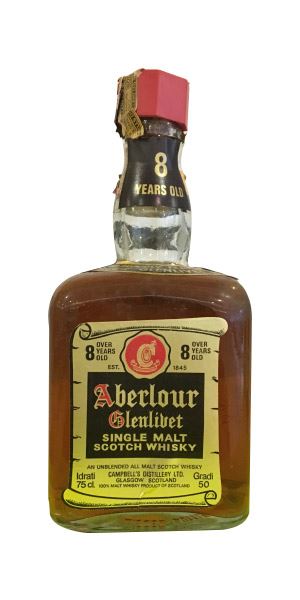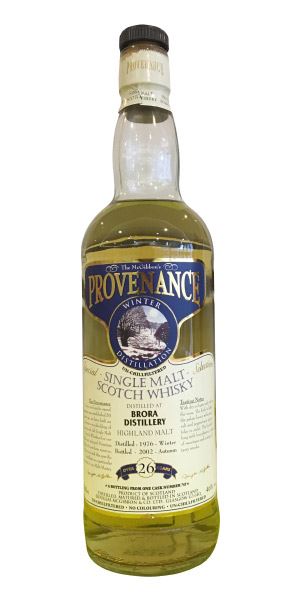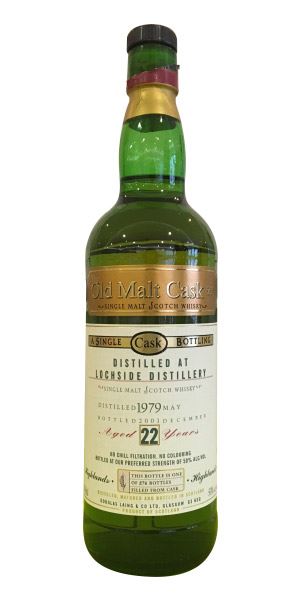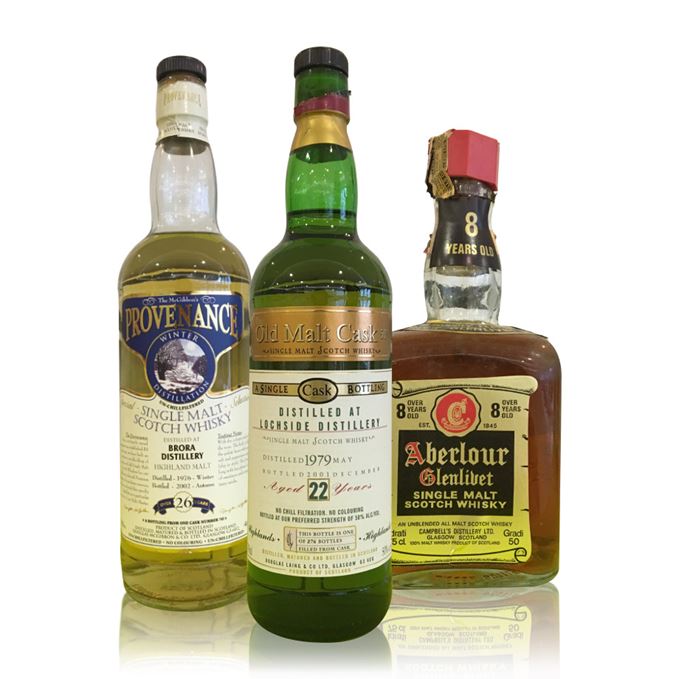-

- Price band
-
£ £ £ £ £
- ABV
- 50%
- Production type
- Single malt whisky
- Region
- Speyside
- Flavour camp
- Rich & Round
- Nose
An old bottle stink kicks things off, then we go deep into a funkiness that teeters on the brink of being off. It’s Sherried, it’s slightly sulphury, with the dank smell of decay – old, wet leaf mould and slightly overripe mushroom. Work at it and things begin to ease into a certain normality – the funkiness shifts to French polisher’s workshop, accompanied by some waxiness. A touch of water brings out heavier fruits, but also the sulphur.
- Palate
Here, the fruits begin to take the upper hand – there’s some of the distillery’s distinctive blackcurrants, along with hedgerow jam, sloe gin and a boiled sweet element that sits somewhere between orange Spangles and barley sugar. Amazingly, for an eight-year-old, there’s some grippy tannins. Water shows more of the dried fruit elements and a clinker element.
- Finish
Sulphury and maderised.
- Conclusion
Hey, that’s the risk you take with old bottles. Still an interesting experience.
- Right place, right time

- Price band
-
£ £ £ £ £
- ABV
- 46%
- Production type
- Single malt whisky
- Region
- Highland
- Flavour camp
- Smoky & Peaty
- Nose
Phenolic from the start, but not in an all-enveloping fug of peat smoke. Rather, this is maritime in effect: wet oilskins, brine, seaweed, rock pools. There’s a gentle note of vellum and vanilla sauce underneath. It’s only when water is added that you begin to head inland – light grassiness and a very gentle meatiness, like veal stock, emerges. It’s a whisky that’s as much about the air and the spirit as the wood.
- Palate
A perhaps surprising dusty start, with drying smoke. While the fresh seashore aromas remain in place, now the oily feel takes hold, along with some fascinating moorland elements – heather root, scented grasses, damp moss and the smell of a freshly-sheared sheep (or maybe it’s a new sheep fleece). In time, a little marzipan emerges. A subtle elegance.
- Finish
The smoke returns. Freshness.
- Conclusion
The joy of Brora is that you are never quite sure what variation on the theme you are going to get. This is it setting sail across the North Sea, rather than being stuck next to a peat fire. Lovely stuff. There’s some debate as to whether this is actually 26 years old. Does it matter? Not really.
- Right place, right time
A lost distillery, a lost island.

- Price band
-
£ £ £ £ £
- ABV
- 50%
- Production type
- Single malt whisky
- Region
- Highland
- Flavour camp
- Fruity & Spicy
- Nose
An immediate green oily opening that is a dead ringer for Teaninich – there’s coumarin, then the scent of linseed oil and then wet grass –- a bit like a wet cricket pitch after the game has finished. Allow it time to open (helped by some water) and more fruitiness comes out: white fruit, green grape and, finally, a drying, slightly chalky quality…
- Palate
…then it changes completely. The green, oily elements recede and you are presented with a fresh fruit salad: melon, grape, cherry, peach, mango. The oiliness is now fully integrated and performs more of a textural job. The overall effect is like a light single pot still (almost Green Spot). The back palate – and this is enhanced with water – is bright, with light spices akin to a Vietnamese salad.
- Finish
Grapefruit acidity. Long.
- Conclusion
A shape-shifter. Another of those ‘oh.. what if’ distilleries that is steadily building a belatedly high reputation. The upside of that is that prices remain keen.
- Right place, right time
Stumps. Head to the pavilion.

Our latest selection of rare whiskies summoned up from the vaults takes us back in time to the 1960s and 1970s which, in retrospect, looks like whisky’s age of innocence. Here we find two long-shuttered distilleries and an early example of a Speysider that remains hugely popular to this day.
That’s where we start, with an eight-year-old Aberlour bottled for Rinaldi and the Italian market. With its distinctive square bottle and scroll-like label (‘unblended all malt Scotch whisky’), it’s very much a creature of its time.
What time? Well, this was bottled in the early 1970s, dating its distillate to the mid-1960s. It’s high-strength (50% abv), but the ensuing 50 years haven’t been entirely kind to the liquid, giving a funky, almost-off quality that chief engineer Dave Broom nonetheless finds interesting.
Beyond Port Ellen, Brora is perhaps the most celebrated of lost distilleries (and, like its Islay colleague, it’s set to be revived in the next few years). Part of the Highland distillery’s charm, says Broom, is that you’re never quite sure what version of Brora you’re going to get (distillation regimes varied quite widely in its latter years).
In this case – distilled 1976, bottled 26 years later (we think) – it’s not full-on, peaty Brora, but a more gentle maritime character. ‘Lovely stuff,’ says Broom.
Sadly, there’s no chance of reviving Lochside. The versatile plant, with its German brauhaus-inspired white tower looming over Montrose, was demolished in 2005 after being sold to developers several years earlier.
The 22-year-old example tasted by Broom gives a tantalising glimpse of what was, and what might have been, had Lochside been spared the axe. It may be a little late, but this Highland distillery is finally beginning to gain the renown it merits.

